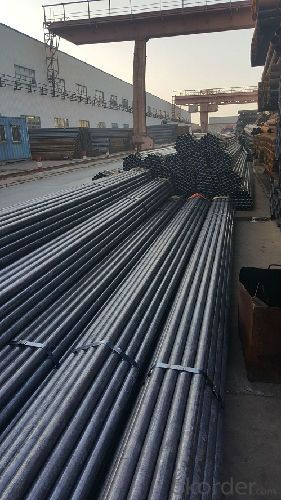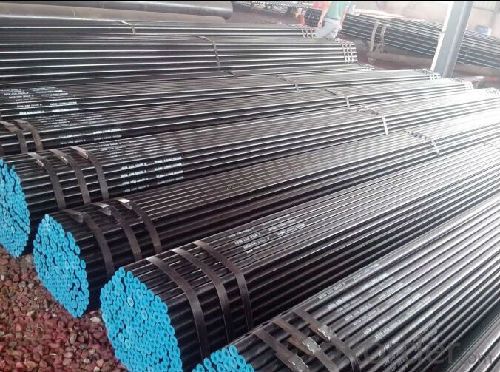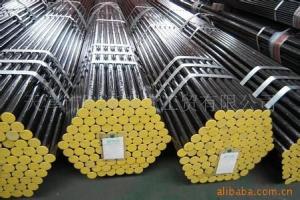Hot sell API Seamless Pipe from CNBM International Corporation
- Loading Port:
- Tianjin
- Payment Terms:
- TT or LC
- Min Order Qty:
- 30 m.t.
- Supply Capability:
- 8000 m.t./month
OKorder Service Pledge
OKorder Financial Service
You Might Also Like
Product Description:
1、Structure of Hot sell API Seamless Pipe from CNBM International Corporation:
API Seamless Pipe is used for construction of long distance pipelines for combustible liquids and gases, nuclear station pipelines, heating system pipelines, general-purpose pipelines, vessels manufacturing, mechanical engineering and instrumental engineering.
2、Main Features of Hot sell API Seamless Pipe from CNBM International Corporation:
• High manufacturing accuracy
• High strength
• Small inertia resistance
• Strong heat dissipation ability
• Good visual effect
•Reasonable price
3、Hot sell API Seamless Pipe from CNBM International Corporation Images:


Packaging & Delivery
| Packaging Details: | seaworthy package, bundles wrapped with strong steel strip |
| Delivery Detail: | 15-30 days after received 30% TT |
4、Hot sell API Seamless Pipe from CNBM International Corporation Specification:
Standard: GB, DIN, ASTM
ASTM A106-2006, ASTM A53-2007
ASME, ASTMGrade: 10#-45#, 16Mn
10#, 20#, 45#, 16Mn
20#, 45#, Q345, API J55, API K55, API L80, API N80, API P110, A53BThickness: 2 - 50 mm Section Shape: Round Outer Diameter: 21.3 - 620 mm Secondary Or Not: Non-secondary Application: Hydraulic Pipe Technique: Hot Rolled Certification: API Surface Treatment: factory state or painted black Special Pipe: API Pipe Alloy Or Not: Non-alloy Length 6-12M 1.Material:20#(ASTM A 106/A53 GRB.API5LGRB,GB),45#,16Mn,10#.
2.Specification range:OD:21.3-610mm,WT:6-70mm,length:6-12m or according to the requirement of clients.
3.Excutive standards:GB,ASME API5L.ASTM A 106/A53,Despite of the above standards,we can also supply seamless steel pipe with standard of DIN,JIS,and so on,and also develop new products according to the requirements of our clients!
4.Surface:black lacquered,varnish coating or galvanized.
5.Ends:Beveled or square cut,plastic capped,painted.
6.Packing:bundles wrapped with strong steel strip,seaworthy packing.
5、FAQ of Hot sell API Seamless Pipe from CNBM International Corporation
①How is the quality of your products?
Our products are manufactured strictly according to national and internaional standard, and we take a test
on every pipe before delivered out. If you want see our quality certifications and all kinds of testing report, please just ask us for it.
Guaranteed: If products’ quality don’t accord to discription as we give or the promise before you place order, we promise 100% refund.
②How about price?
Yes, we are factory and be able to give you lowest price below market one, and we have a policy that “ for saving time and absolutely honest business attitude, we quote as lowest as possible for any customer, and discount can be given according to quantity”,if you like bargain and factory price is not low enough as you think, just don’t waste your time.Please trust the quotation we would give you, it is professional one.
Any question, pls feel free to contact us !
- Q:Why seamless steel pipe called seamless steel pipe?
- Seamless is relative to welded steel pipe, because welded steel pipe is welded with steel strip, seamless steel pipe is made of whole round steel empty, no welding seam.
- Q:How are steel pipes insulated for thermal applications?
- Steel pipes are commonly insulated for thermal applications using various materials such as fiberglass, mineral wool, or foam insulation. These insulating materials are typically wrapped around the steel pipes to create a protective barrier that reduces heat transfer. Additionally, a vapor barrier may be installed to prevent moisture condensation. This insulation helps to maintain the desired temperature of the fluid or gas being transported through the pipes and prevents energy loss.
- Q:How are steel pipes stored and transported?
- Steel pipes are typically stored in warehouses or open yards, stacked in an organized manner to prevent damage. They are often transported using trucks or railcars, secured with straps or clamps to ensure stability. For long-distance transportation, pipes may be bundled together or loaded onto flatbed trailers. Additionally, protective coatings are applied to prevent corrosion during storage and transportation.
- Q:How do steel pipes handle thermal expansion and contraction?
- Steel pipes are able to handle thermal expansion and contraction due to their unique properties and design. When exposed to high temperatures, steel pipes expand as the molecules within the material gain energy and move more vigorously. Conversely, when exposed to low temperatures, steel pipes contract as the molecules lose energy and move less vigorously. To accommodate these changes, steel pipes are manufactured with certain features. One such feature is the allowance of clearance between pipe joints. This clearance allows for expansion and contraction without causing stress or deformation in the pipe. Additionally, the use of expansion joints or flexible connectors within the piping system helps to absorb the thermal movements and prevent damage. Furthermore, steel pipes are often installed with proper anchoring and support systems. These systems are designed to allow the pipes to freely expand and contract within a certain range without causing excessive stress or strain on the structure or surrounding components. Anchoring and support systems also help to maintain the overall stability and integrity of the piping system. In some cases, thermal insulation materials are applied to steel pipes to minimize temperature changes and reduce the effects of expansion and contraction. These insulating materials help to maintain a more consistent temperature within the pipe, reducing the magnitude of thermal movements. Overall, steel pipes are well-suited to handle thermal expansion and contraction due to their inherent strength and flexibility. With proper design, installation, and maintenance, steel pipes can effectively accommodate temperature changes without compromising their structural integrity or functionality.
- Q:What are the applications of stainless steel pipes?
- Stainless steel pipes are widely used in various industries and applications due to their excellent corrosion resistance, durability, and strength. Some common applications include plumbing systems, water supply and distribution, heating and cooling systems, oil and gas industry, chemical processing plants, food and beverage industry, automotive industry, construction, and infrastructure projects. Additionally, stainless steel pipes are also utilized in pharmaceutical manufacturing, aerospace engineering, marine applications, and wastewater treatment facilities.
- Q:How are steel pipes used in the construction of railway tracks?
- Steel pipes are commonly used in the construction of railway tracks as they provide a strong and durable foundation. These pipes are usually used as support structures for the tracks, serving as a base on which the rails are laid. They help to distribute the weight of the trains evenly, ensuring stability and reducing the risk of track failure. Additionally, steel pipes are used for drainage purposes, allowing water to flow freely and preventing damage to the tracks.
- Q:What are the common standards and specifications for steel pipes?
- The common standards and specifications for steel pipes include ASTM A53, ASTM A106, API 5L, and ISO 3183. These standards outline the requirements for the manufacturing, dimensions, and mechanical properties of steel pipes used in various industries such as oil and gas, construction, and transportation. Additionally, specific applications may have their own standards and specifications that need to be met for quality and safety purposes.
- Q:What is the electrical conductivity of steel pipes?
- Due to its metallic nature, steel pipes possess a notable degree of electrical conductivity. The specific composition and properties of the steel employed can influence the electrical conductivity of these pipes. Typically, steel exhibits a conductivity range of 6.99 × 10^6 to 9.64 × 10^6 siemens per meter (S/m) at room temperature. Consequently, steel pipes are capable of effectively conducting electricity and finding application in diverse fields, including electrical transmission and grounding systems.
- Q:What is the purpose of a steel pipe coating?
- The purpose of a steel pipe coating is to provide protection to the pipe from corrosion and other environmental factors that can lead to deterioration. Coating the pipe with a layer of material helps to create a barrier between the steel and the surrounding environment, preventing direct contact and reducing the risk of corrosion. This is especially important for pipes that are used in industries such as oil and gas, water distribution, and construction, where they are exposed to harsh conditions such as moisture, chemicals, and extreme temperatures. The coating also helps to enhance the durability and longevity of the pipe, ensuring that it can withstand the demands of its intended application. Additionally, certain types of pipe coatings can also provide insulation properties, preventing heat loss or transfer in applications where temperature control is critical. Overall, the purpose of a steel pipe coating is to protect the pipe, extend its lifespan, and ensure its optimal performance in various industries and environments.
- Q:Can steel pipes be used for industrial ventilation systems?
- Yes, steel pipes can be used for industrial ventilation systems. Steel pipes are commonly used in industrial settings due to their durability, resistance to extreme temperatures, and ability to handle high-pressure applications. They provide a reliable and long-lasting solution for transporting air in ventilation systems, ensuring proper airflow and maintaining a safe and healthy environment in industrial facilities.
1. Manufacturer Overview |
|
|---|---|
| Location | |
| Year Established | |
| Annual Output Value | |
| Main Markets | |
| Company Certifications | |
2. Manufacturer Certificates |
|
|---|---|
| a) Certification Name | |
| Range | |
| Reference | |
| Validity Period | |
3. Manufacturer Capability |
|
|---|---|
| a)Trade Capacity | |
| Nearest Port | |
| Export Percentage | |
| No.of Employees in Trade Department | |
| Language Spoken: | |
| b)Factory Information | |
| Factory Size: | |
| No. of Production Lines | |
| Contract Manufacturing | |
| Product Price Range | |
Send your message to us
Hot sell API Seamless Pipe from CNBM International Corporation
- Loading Port:
- Tianjin
- Payment Terms:
- TT or LC
- Min Order Qty:
- 30 m.t.
- Supply Capability:
- 8000 m.t./month
OKorder Service Pledge
OKorder Financial Service
Similar products
New products
Hot products
Related keywords































